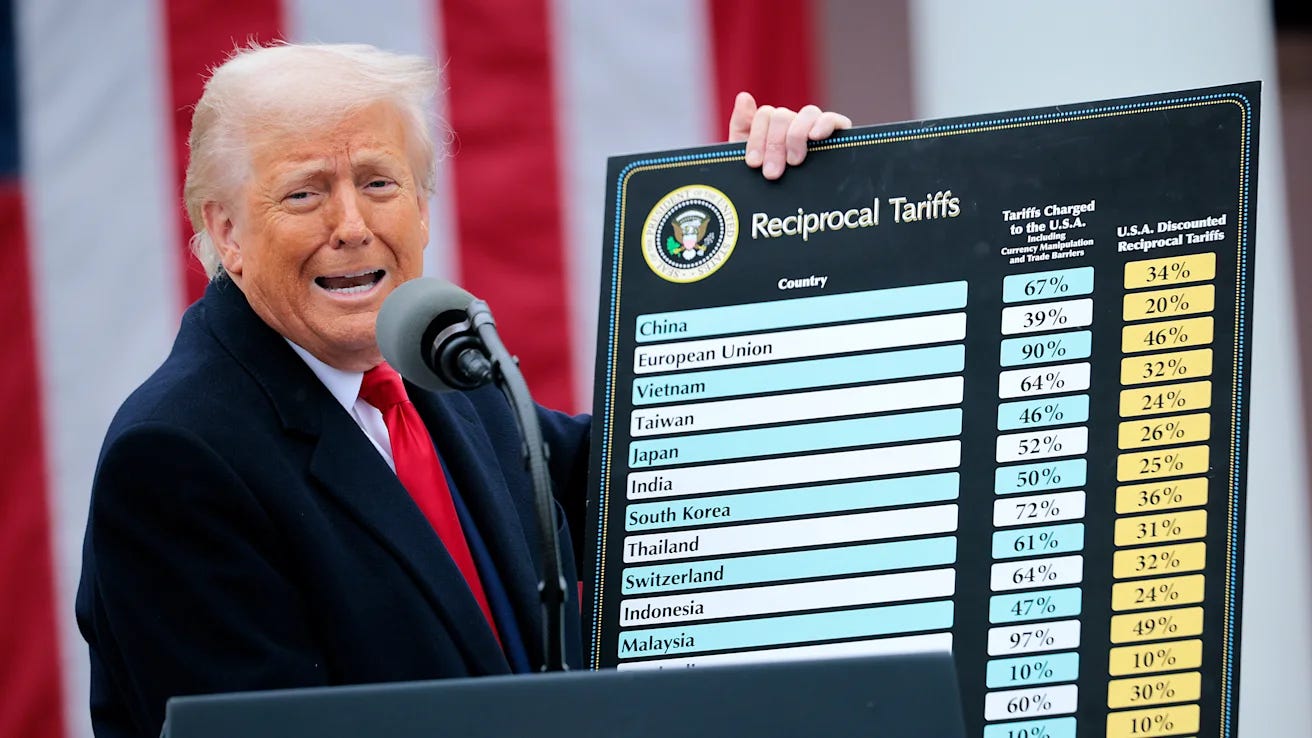The economics of trade has never been my métier. That won’t stop me from reacting to Trump’s so-called “Liberation Day.” Enlightenment is welcome; the comments are open. I should confess I had to radically revise this post around 10 p.m., once my wife told me that the stock index futures were crashing.
First a word for his excited critics. Trump is a bluffer. He hints at great deeds, does little, then claims great victories. His followers never know the difference. So too with his tariffs.
I should confess at first I found the across-the-board ten percent tariff underwhelming. The higher ones are even less credible. Trump fancies himself a deal-maker. He loves the idea of lining up a foreign head of state and jamming them into concessions. Problem is, he is murky on what a concession is, and he isn’t going to roll over such people the way he did a cement contractor in New Jersey. So the first thing reducing the impact of the tariffs is the ability of foreign negotiators to steal his drawers.
The second thing is that exchange rates can adjust to tariffs, reducing their impact. I tried to explain this before. It’s complicated.
The third thing is that a tariff can under certain circumstances be beneficial for domestic employment. Note the Biden Administration continued a number of Trump tariffs from his first term. The saintly former senator Sherrod Brown is famously soft on tariffs.
Fourth, Trump has already plowed the field of reduced expectations, walking back promises that he could command prices to fall, cautioning the public that pain must precede gain.
The impacts in general could turn out to be opaque to the general public. The news media won’t be much better informed, especially because they are either in the bag for Trump, feel obliged to paint everything in neutral colors, weenies, or just dumb. Or all four.
At this point, the financial markets look to be in an uproar, the major indexes dropping two or three percent. That’s a lot, all at once. This time, Trump might have put his ass in a crack. Still, for the left, the fortunes of the financial markets, in and of themselves, are not a big priority. The drops in employment and wages that follow a “correction” or worse are more important. Most people don’t own any stock.
Yes, tariffs are a tax increase on Americans. But their impact on prices could end up being muted to the point of invisibility. My friend Dean Baker does not expect much trouble for Trump’s Trade Enemy Number One, China, either.
The greater political pain for Trump will come from the reactions to his messing with Social Security, Medicaid, and critical functions performed by the Federal civil service, ideally blooming in next year’s midterm elections that return control of the House of Representatives to the Democrats.
I wouldn’t try to get up much of a head of steam over tariffs. The real threats to daily life could be tied to another pandemic, the next natural disaster, or a new financial meltdown, any of which could blow up at any moment, all of which would require administrative governmental expertise not observable at the moment.
Some guys who are much smarter than me think the entire Trump policy makes perverse sense and could succeed. One of them is Yanis Varoufakis. Another is Jamie Galbraith, who while aghast at most Trump policies, is less overwrought about the tariffs.
It’s still necessary to come out April 5th.




